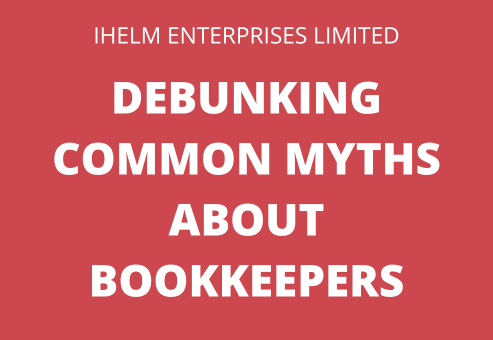During August’s Facebook Live, I talked about some of the common myths about bookkeepers.
Bookkeepers play a crucial role in the financial well-being of businesses, ensuring accurate recording of transactions and maintaining financial records. However, despite their significance, there are several misconceptions and myths surrounding bookkeepers. In this blog post, we will debunk some of the most common myths people have about bookkeepers and shed light on the valuable contributions they make to any organisation.
Myth 1: Bookkeepers are the same as accountants.
One of the most prevalent misconceptions is that bookkeepers and accountants are interchangeable. In reality, while they both deal with financial matters, their roles and responsibilities are distinct. Bookkeepers are primarily responsible for recording daily financial transactions, maintaining ledgers, reconciling accounts, and generating financial reports. On the other hand, accountants analyse the financial data provided by bookkeepers, interpret it, and provide strategic financial advice to businesses.
Myth 2: Bookkeeping is an easy task.
Some people believe that bookkeeping is a simple and mundane task that anyone can handle. This myth undermines the importance of bookkeepers in maintaining accurate financial records. In truth, bookkeeping requires attention to detail, a deep understanding of accounting principles, and proficiency with accounting software. A skilled bookkeeper can make the difference between a business that thrives and one that faces financial challenges due to inaccurate financial information.
Myth 3: Bookkeepers only handle data entry.
Another myth is that bookkeepers are merely data entry clerks, mindlessly inputting numbers into spreadsheets. While data entry is part of their responsibilities, it is far from the only thing they do. Bookkeepers also categorize transactions, reconcile accounts, generate financial reports, manage accounts payable and receivable, and ensure compliance with financial regulations. They are an integral part of a well-organized financial system.
Myth 4: Automation will replace bookkeepers.
With the rise of automation and accounting software, some people believe that bookkeepers will become obsolete. However, while automation can streamline certain tasks, it cannot replace the human insight and critical thinking that bookkeepers bring to the table. Skilled bookkeepers are essential for interpreting financial data, identifying discrepancies, and making informed decisions based on the numbers.
Myth 5: Bookkeepers are only needed for large businesses.
Many small business owners believe that they can manage their financial records without the help of a bookkeeper. This myth can lead to costly mistakes and missed opportunities. Regardless of a business’s size, bookkeepers are essential for maintaining accurate financial records, ensuring tax compliance, and providing valuable insights into the financial health of the company.
Myth 6: Bookkeepers are expensive.
Some business owners hesitate to hire a bookkeeper, thinking it will be a costly investment. However, the benefits of having a skilled bookkeeper far outweigh the costs. A bookkeeper can help save time, reduce the risk of financial errors, and improve financial decision-making, ultimately leading to cost savings and improved profitability.
Bookkeepers are an indispensable asset to any business, big or small. Their expertise in financial management, attention to detail, and ability to provide valuable insights make them crucial to maintaining the financial health and success of an organization. By debunking these common myths about bookkeepers, we hope to highlight the significant role they play in today’s dynamic business environment. Whether you are a business owner or an aspiring bookkeeper, it is essential to recognize and appreciate the value that bookkeepers bring to the table.
If you have any questions about bookkeepers and how they can help you grow your business, please feel free to e-mail me.

